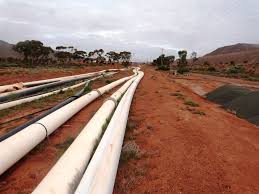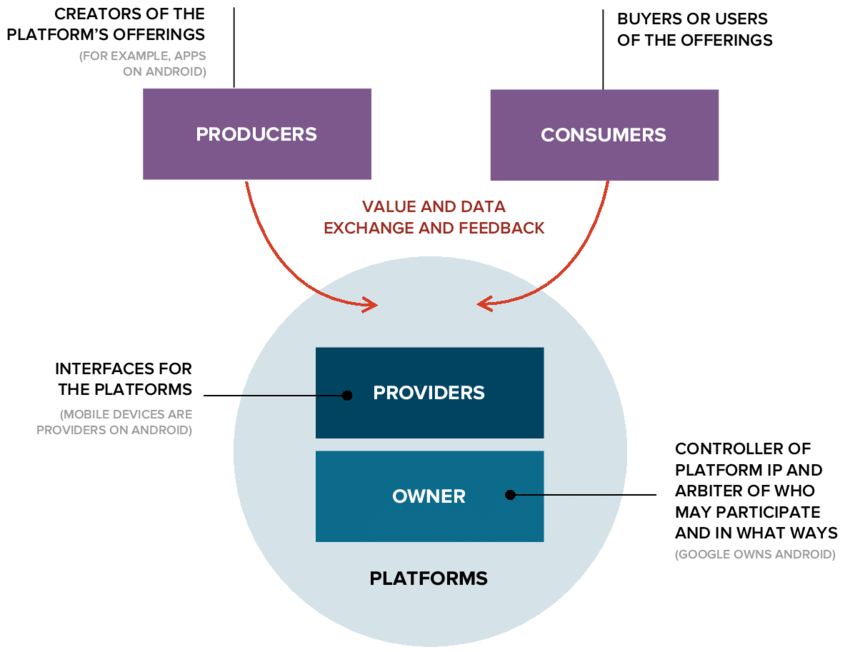I now use Airbnb when I travel, and I prefer it to hotels. Not only because it is usually cheaper, but especially because there is a lot more variety when choosing a place to stay, and those places have more “personality” and don’t look all the same, like hotel rooms. Even better, you don’t need to go through any annoying registration when you arrive. It is quick and easy.

Like Airbnb, other “platforms” are revolutionizing many industries by using technology to connect people, organizations, and resources in interactive ecosystems in which great amounts of value can be created and exchanged: it is a new business model. Uber, Facebook, Alibaba, YouTube, Amazon are just a few examples of “platforms”.
Platforms can connect several different types of users, like Amazon that connects sellers and buyers, or they can have one primary type of user, like Facebook’s community, where users interact with each other socially. What all of these platforms have in common is that they bring people and organizations together in one place where they can interact.
The Platform Revolution: How Networked Markets Are Transforming the Economy and How to Make Them Work for You is a book co-authored by Sangeet Choudary, Geoffrey Parker, and Marshall Van Alstyne that describes how platform businesses work, how they can be built and operated, and what is their impact on current society.
The authors explain that platforms businesses, when built properly, benefit from network effects, a phenomenon whereby a product or service gains additional value as more people use it. The network effect makes the value of a platform grow exponentially, because as more individuals join, the potential number of connections between individuals increase algorithmically, making the network more valuable. Think of Facebook, for example, the more people join it, the more value acquires.
“The network effect is a self-reinforcing loop of demand generating more demand.”
From Pipeline to Platform

Traditional businesses are mostly organized as pipelines. Pipeline businesses follow a linear value chain, where, for example, the materials from suppliers go through a series of steps (processes) that transform them into a finished product that is worth more. Pipeline businesses try to own and control every aspect of the production processes from manufacturing to sales.
In the old days, Apple was essentially a pipeline business. But then on January 9, 2007, Apple CEO Steve Jobs introduced the world to the new iPhone for the first time with the words: “Today Apple is going to reinvent the phone.”
At that moment in time, the five major mobile-phone manufacturers collectively controlled 90% of the industry’s global profits, but by 2015 the iPhone was generating 92% of global profits, while most of the former incumbents were not making any profit at all.
How can be explained the iPhone’s rapid domination of its industry, even accounting for its novel features and design? According to the authors, Apple (and Google with Android) completely changed the industry by exploiting the power of platforms. Platform businesses bring together producers and consumers in high-value exchanges, where the most important assets are information and interactions.
Apple changed the industry by making the iPhone and its operating system as something more than products. Apple organized them as a way to connect app developers on one side to app users on the other, while generating value for both groups at the same time. As the number of participants on each side grew, the value of being part of the “Iphone ecosystem” increased, thanks to the network effects.
Though they come in many forms, platforms all have an ecosystem with the same basic structure that comprises four types of participants. The owners of platforms who control their intellectual property and governance; the providers who serve as the platforms’ interface with users; the producers who create their offerings, and finally the consumers who use those offerings.

Disruption: How Platforms Conquer and Transform Traditional Industries
Platforms are like traditional marketplaces, where buyers and sellers can come together and transact business. However, the difference between traditional marketplaces and current platforms is that the digital technology allow communication all over the planet and instant transactions.
The internet can reduce costs and platforms are more efficient than pipelines because they can scale rapidly, faster than traditional businesses.
Platforms make it easier for producers to participate. For example, Airbnb makes it possible for hosts to rent out their spare rooms, and by so doing they find new sources of supply among people who probably wouldn’t have ever considered renting part of their home, without the benefits and easiness of connecting to the Airbnb platform.
Platforms also facilitate and sometimes even create new forms of consumer behavior. For example, people now jump into a stranger’s car when they use Uber. Platforms have the power to make this happen because they have built-in mechanisms that create trust between users, like reviews.
Finally, platforms exchange the traditional quality control coming from the business for user driven curation. Think for example of Wikipedia, where users curate the content for free instead of using professional writers and editors, like was the case with the failed Microsoft’s Encarta. In fact, the demise of Encarta has widely been attributed to the competition from Wikipedia.
There are three different types of platform disruption:
- Separating assets from value. Ownership of assets can becomes separated from their value. For example, the same MRI machines can be used by different hospitals and clinics that don’t need to own them, but have acquired the right to use them part-time.
- Re-intermediation. The Internet has not eliminated middlemen, but has created new kinds. For example, executives in the music industry now they can search YouTube to find new talents instead than relying primarily on agents.
- Market aggregation. Disorganized markets can be combined and centralized. For example, Amazon and Alibaba have created unified platforms for wholesalers all over the world.
As mentioned before, pipeline businesses can restructure themselves to take advantage of platform economies, even if it is not a simple thing to do.
_____________________________________________________________
OTHER POSTS ABOUT THE PLATFORM REVOLUTION


Trackbacks/Pingbacks